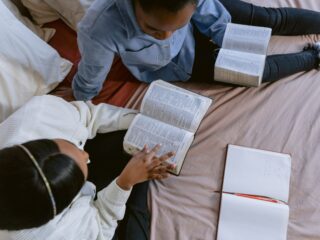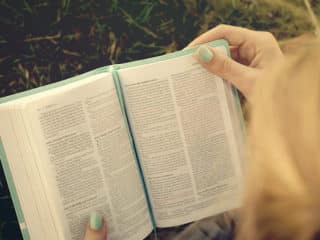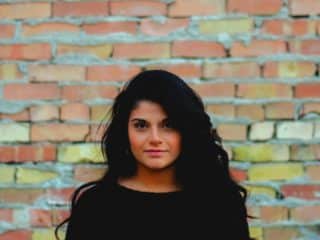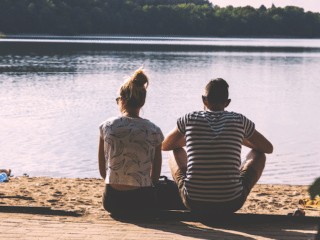Bonus Episode: There’s Hope Through It All With Tanner Olson | Words with Writers

From Today's Episode:
Welcome! We’re in our Words with Writers Bonus Series and today’s topic is There's Hope Through It All With Tanner Olson.
Text Jen the word WONDER at 55444 *USA and Canada numbers only
Tanner Olson is an author, poet, speaker, and podcaster. He's the author of four books, including the highly acclaimed collection of poetry, "Walk A Little Slower." His writing has been described as “hopefully unique” as it blends faith, humor, and curiosity. Through his work Tanner seeks to point readers and listeners toward the ultimate source of hope and love, Jesus. He lives in Nashville, TN with his wife, son, and their goldendoodle, Pancake.
Connect with Tanner
Quick Links
- Spotify Playlist: Good God Talks Worship
- Subscribe below for your Free Download of the Conversational Journaling Pages
Here's the episode transcript
Hey friends, welcome to another special episode. as part of our pop-up mini-series Words with Writers. This series is different from our typical podcast format. It's also a different length than our typical eight-minute limit. If you're new around here, I'm Jen, and I'm offering this mini-series as I'm talking with other writers about the words that we have with God before the words that make it to pen and paper or to our screens. And today's episode is not going to disappoint. I have Tanner Olson here with me on the podcast and Tanner is a writer and a poet.
And if you're listening to this episode, anytime during the month of March, I want you to pick up your phone and text me. So you'll text me at the number 55444 and text me the word WONDER.
And one of the reasons behind this mini-series it's really in celebration of my newly released poetry collection, A Beckoning to Wonder, Christian Poetry Exploring God's Story. And so when you text me that word wonder, I'm going to text you back and I'm sending out free gifts really all month long to celebrate the launch of that book and also this pop-up series it's continuing into April. so you'll get alerts for when new episodes like this one air, because I know you're not going to want to miss them.
So again, text me the word WONDER at 55444 and now it's time to jump into today's episode With Tanner.
Tanner, you know that I've been following your content online here for a minute, and I love the way you share hope with people. But for those who don't know you as much, would you just start us off by introducing yourself?
Yes, my name is Tanner. Uh, what I'd like to say is that I'm an author, poet, speaker, podcaster, like you, I do a lot of different things, but all of what I do kind of revolves around spreading hope and inviting people into rest, whether that's through, books, I've got like four books of poetry out and a couple more on the way.
I host a podcast as well. I travel around the country and speak and share poetry and deliver messages of hope. Yeah. Yeah, I just do a lot of things with words and hopefully, uh, hopefully the words that I share lead people feeling a little bit more hopeful, than before.
Well, as one of your readers and listeners, I can tell you that they do for me. And so I'm, I'm really excited to get to introduce you here, Good God Talks is all about having these uncommon conversations with God. in everyday life moments. And so as Tanner and I were talking a little bit right before we hit record, oftentimes when we're in the writing space and we're sharing poetry and beautiful words out with the world, those words came from these private times with the Lord, where we're wrestling through something as believers, we're always looking to engage relationally with God.
Tanner, I would love to hear a little bit more about your Start in your writer's journey, but also how you got to know God how you came into this place of wanting to write poetry that inspires hope related to him.
Yeah, so I uh, I grew up in the church.
So I grew up in So like right outside of Orlando, which means this, yes, I am technically a Florida man. But I was baptized as a baby, grew up in the church, walked with God all through. I mean, I feel like I've always been like, I've always known him. He's always known me. I have these vivid memories from high school.
We went on this mission trip. I was 16 years old. I think I was a sophomore. I just had knee surgery. And now we went to West Virginia, and I was on like crutches for half of it. But then like a typical high school boy, like I was like, I don't need this anymore. I'm good to go. And it was like, so it was a service-based trip.
And for me, the switch that happened when everything seemed to like click, it was this Thursday night. We're reading through John 13 when Jesus washes the disciples' feet. And that was the night when like everything for me, I was like, Oh wait, he's, He's real. It's not this like far off distant God, but God has come close to us through Jesus.
Uh, I am truly forgiven and loved and free and I get to walk in that freedom and that forgiveness and have a life of freedom and of hope. And since then, like that, everything just kind of shifted my, uh, you know, I was going to be in the NBA, but then from then on, I was like, you know what, I'll probably be like, I want to work in the church or do some sort of like, mission work of sorts, whether that was like a pastor or a youth leader or whatever it may be.
And then, in college, I started writing. I wrote a little bit in like middle school and high school because I also wanted to be in like a pop punk band, but I can't sing or play music. And so I was like, just left with writing sappy, angsty lyrics. And then that eventually turned into writing poetry.
I saw a poet perform one time and I thought, Oh my goodness, that's exactly what I want to do. For some reason, something inside of me unlocked when I saw this poet named Anis Mojgani perform and I said, okay, I think that's the thing that I'm supposed to do, with some of my life. And so just started writing and creating and started putting things out into the world and chase this weird, wild dream.
And so I've been doing this for like 11 years now. So I started when I was 23 and I'm 34 now and here we are. That was like, uh, the very abbreviated version of my story, but you have to wait till the memoir comes out sometime in the next 30 years.
Oh, we can't wait. We definitely can't wait. Well, I love that. Do you feel like those initial seeds of wanting to write song lyrics and wanting to write poetry really easily carried over into like the way that you talk to God or the way that you connected with him? Or was it more separate for you at the beginning?
I don't think there's like a, for me, at least, I think it's different for everybody. I kind of just bring my full self to the table. And so when it comes to prayer, when it comes to writing, Even conversations with friends, like it's like, I can only be me.
in conversations with friends and my writing, it'll look a little different because of course it looks a little bit different. But usually like, even when I talk with God, it is very much, uh, feels very similar to the way that I write and the way that I speak to others. I don't try to like make myself up or try to be somebody that I'm not.
It's just like, here's what I have to offer. Here's what I have to give her now. Like my written prayers or maybe prayers that I’ll post and share for others who are searching for the words. Those will be edited and dressed up a little bit. But for the most part it comes from the same heart of Understanding that we are invited to speak to God at all times and in all ways that he can handle Our questions he can handle our frustration.
He can handle our Uncertainty or disappointments and it's just a come to me and let's talk. Um, and that's kind of the way that I also approach writing as well. There's really nothing that's off limits, just bring what you have and see what comes from it.
Oh, that's powerful. And so as someone else who grew up in the church, so I have been in church my whole life I came to Christ at a really young age, but I had no clue about relationship with God. And so it was really works based. I tell people I was a child Pharisee. Like I was like, I'm going to judge everyone here. And I'm judging myself super hard because I'm working really hard and you should be too. Um, But I love hearing that even growing up in the church, your posture toward God was to bring your whole self, like it is with your friends, like it is in real life. Was that also a learning curve or was that natural for you? Because I had to change my approach to actually bring my true self to God.
I would say that there are certainly seasons because you know when you're high school, college. I mean, you're just, you're trying to figure everything out. And life is life as hard as a 30-year-old, but life was so hard as a middle schoolers when you're, when you're growing up and everything still feels new, and you don't know what you don't know.
At least for me, I didn't go through like grief, uh, till later on in life. I didn't experience a lot of these things that really, uh, try to pull you away from the goodness of God. And so, I don't know, it just, just for me, it was just whatever, like the seasons that I was going through, walking through that.
I also had a lot of really good mentors and leaders in my life who just invited us to, you know, truly like, just like, you know, Come as you are, bring yourself before the Lord. And I think a lot of it was, you know, as somebody who was interested in poetry, I would read a lot of the Psalms and in the Psalms, you don't hear anybody holding back.
It's always just like, David is, is being honest before God offering what he has, the questions, the wrestling, the fears, the anger. And so when I read through that, I'm like, well, if it's in the Bible, it's a pretty good example for how we can communicate. to God and how he responds to, to our prayers.
And there's, I don't think, you know, there's no point where God's like, well, that was way too strong. It's like he can handle it, you know? I also was a kid with a lot of emotions. And so I would have teachers and pastors talking about like these, you know, these emotions aren't, they're not a bad thing, but you know, how do you walk through them?
How do you carry them? Uh, You know, I just, I just felt a lot as a kid. And so, um, they kind of, it was easy for me to open up and say, here's what I think.
I'm going to quote you to you. So forgive me if I butcher it, but there's a part in your, continue poetry collection where you say “most of my prayers begin with an audible exhale.”
And I feel like that is so relatable for so many people. And then you go on into the poem to talk about how praying looks different for you these days. “I'm asking God more questions and sitting longer with the silence.” Can you tell us a little bit more about that?
Yeah. For the longest time, I thought prayer was me always talking and that's, that's, that's part of it.
But I think when we begin to lean into the mystery, the beauty that God is here, that God is with us, that we are not alone, that he's a good, um, a good father who comes close to his children and listens.
We can just be with the one who cares for us. We don't have to try or make ourselves up or be somebody that we weren't created to be. He knows who he created.
And a lot of that book, “Continue” was written kind of throughout the pandemic. Which is a time where I didn't have a lot of answers, had a lot of questions, a lot of confusion, a lot of different noises and voices.
And there's this very loud time in the world and a very isolating time. And so I would wake up early before my wife got up and I would sit at the kitchen table. And I was so tired of looking at my phone, looking at screens, and I would just sit there and exhale and drink coffee and sit and wait. And listen and be and say some things.
But for the most time, most, most of the time, it was just me sitting there knowing that I was not by myself. I do believe that a great way to begin a prayer is a deep breath is an honest exhale and then listen. Being in God's word and reading through that and then sitting with the silence and knowing that it's not really silence.
It takes discipline, practice, and we could call it, it's not failure, but when things, it takes not going the way that you want it to go or think it's going to go. But it's the whole, like the, the beauty of paying attention and showing up. Right. And I think that's a lot of what prayer is, is it's paying attention and it's showing up.
And, and walking in that, knowing that God's honoring his end, even when we don't see him, I can trust that he is here with me and I can, I can ask him to show me and I can tell him that it's hard because I don't sense him right now, but knowing that if I'm coming, he's also going to be there. He always comes through.
Yeah, he's not, he's not trying to outrun your conversation, right? He's like, Oh, I see her coming. Hold on. Yeah. It's when the Amazon guy comes from the door and you're like, I could meet him at the door. Or I could wait for the package and then watch him leave and then go out. It's not that.
It is, he, we are there, he is already there, and we get to join him in that, you know. God is already, speaking. We just get to come to be with him.
Yes. Okay, so something else I love in what you do and how you go about what you do is the invitation to slowness. Yes. And has that always been something that was natural and easy for you to move slowly?
Okay. I'm like, how, how did you do this?
Oh, I write about the things I'm terrible about. Like I'm terrible. Like I'm not great at praying. I am not great at slowing down. I am not a very patient person. I write about all the things that I want to be about. Um, and I am about those things like that is, it is part of me, but I really want to be somebody who is.
Just lives a very slow and quiet life. I want to be somebody who seeks the silence. I want to be somebody who starts his day, uh, in prayer and in solitude and in reflection. I want to be that person. My mind is a very busy place. It is always going and I'm always trying to slow down. I have, I mean, this is my to do.
Like, it's just like go, it is to do list after to do list. It is looking to the next thing. It's trying to peek around the corner. It's worrying and obsessing about the projects that I'm working on. So for me, like the things that I write about, it's like, you know, I have a book titled walk a little slower.
I want to walk a little slower. So that's why I wrote it. It is like it is a constant reminder for me to walk a little slower, to speak a little slower, to just enter into like, like the slowness and the certainty and the sureness that God offers. Right? Like I have this, I have a poem, it's titled, you cannot make God hurry up and it's all about how God is slow until he isn't right.
And we can join him in that. Yeah. in that slowness. And I, and I want to, uh, and a lot of times I feel like I'm just trying to get up ahead and then be like, Hey, are you coming rather than walking with him and saying, I'm happy just to be walking with you.
So no, I'm not a slow person. I'm not, I want to be, I, and I'm, and I'm, and I'm getting there, you know, um, I'm getting there.
Well, I think a lot of us can relate to that. I think the art of slowness has been lost a lot in the rapid fire. I mean, talking about Amazon deliveries, which I mean, they come regularly to my house. They, they know. but just the speed and the hurry and the expediency of the moment. I think it's something that can feel hard to build as a practice in slowing down to notice God in slowing down to engage at a slower pace of life. What have you found helpful in building that practice?
Well, I think it's, it's eliminating the distractions. And for me, we probably have like several distractions in common. Our first one is probably our phone. Uh, and so like, the only notifications I get are from two people that I follow on Twitter. And it's only NBA news. Like those are the only notifications that I get. I don't get any other notifications besides text messages. Right. So it's like eliminating the notifications.
It's the, the beeps, the vibrations, like all the stuff. It's trying to create healthy rhythms that pull me away from screens or from the things that I want to overthink or obsess about. It is going for a walk. It is. praying. It is sitting in silence. It is moving my body. It is doing all of these things to enter into like a life well lived.
Like I don't want to get to the end and be like, I spent too much time on my phone. I don't want to get to the end and, you know, say, Oh, I should have spent more time with this person or with these people or in prayer.
Like I want to do the things that I know matter and give my time and attention to it.
I love the practical steps you shared there because it, it does, it can feel like this huge obstacle that there's no way I can possibly massively pivot my life from a hustle culture to a slower pace.
Yeah, and I think one of the reasons why I, you know, I titled this book “Walk a Little Slower” or why, you know, I call my podcast “Walk a Little Slower” is because then it becomes this helpful and healthy reminder for myself to do those things.
And that kind of goes back to like, you know, why do I write about the things that I write about is because I believe they are true and I am learning to live them out. I'm somebody who needs a lot of reminders around. I think it's one of the reasons I'm a big fan of words, but these little bits of like honesty, these little bits of hope that really help us, I don't know, like maybe it's right to say, like live a full life. Or to slow down and to walk with God and to see that things are, and there's brokenness, but there's also beauty in the brokenness as well.
Yeah. I don't know. I feel like this whole like poet side is coming out of me.
You know?
I love it. Actually, if you have a poem that you would want to read today, I would love for you to share one of those because I do think there's, practice by, by the experience that sometimes when we're drawing near to God, when we're trying to slow down, simply just taking a moment and being slower in the moment helps us start. And poetry and listening to poetry is a great way to do that.
Well let me, let me read the one. Let me this, let me read “Walk a Little Slower” from my book “Walk a Little Slower.”
Uh, it, it goes like this.
I think today I'll walk a little slower and breathe a little deeper. I'll leave my phone face down inside and give my eyes a rest to see beauty beyond a screen. I'll grab a light jacket so I can still feel the cold wind hold her hand until it gets sweaty and I'll let go, but I'll never let go.
I walk alone between shadows, cut through the field, cross the street when the car is clear. Today, I want to find myself beneath the limbs of the trees, and later on below a few million stars. Maybe we'll see a dog, or bump into old friends, or both. And I'm not counting steps, or miles, but I'm just walking because for now, I can.
And I don't know what the future holds, if my days left are long or short, or Well, you get it. Maybe grief is around the corner or a missed call on my face down phone back inside. Maybe there's good news in my inbox or a miracle waiting in the welcome of the next month and in the morning. Well in the morning, I'll sit a little longer and drink a little deeper.
I'll watch the light make its way through the dark morning because the light, the light always finds a way. And I'll remind myself life won't always look the way it does. Change is coming and it might even be here. I'll remember the steps forward and the steps back that led me to where I am. And before I begin to move these feet once again, I will slowly breathe in grace and exhale peace knowing that every piece of me is here to be.
And whatever may become, well, for now, for now I'll walk a little slower and breathe a little deeper. Because right now, I'm alive. And everything is okay. It's not perfect, and that's okay. And that's what I'm learning to tell myself these days. Everything is okay. It's not perfect. And that's okay.
And that is okay.
I think that's a hard line to even wrestle through for a lot of us. Like I'm an achiever type person. So everything being not perfect and it's still being okay is sometimes harder for me to reconcile than others.
I end most of my like poetry shows with that poem.
Um, and then every time I say, you know, everything is okay. Everything will be okay. Everything's okay. In the back of my mind, I think about the times that I have asked and wondered. Everything, you know, or doubted if everything is going to be okay. And so I have this short little, like, addendum to it. But it says, when I say everything will be okay, what I mean is in the end everything will be okay.
Along the way, it will not all be okay. You already know this. There will be sadness and death and failure. There will be brokenness and moments that feel as though they are beyond repair. There will be pain and fear and unwanted changes to your story. There will be seasons when you feel far from okay and moments when you wonder if the last line of this poem is true.
Of the little, I know there is one thing I know for sure. Through it all, there is hope. And hope cannot help but live on as it invites us to lean in and hold fast to a light that continues to last. It moves us to love and dream and give and continue and stay for another day. It leads us to pray and forgive.
And cling to grace and believe the last line of this poem is true. Everything will be okay. Even if everything isn't okay today.
That's a good reminder.
That's a really good reminder.
I write what I need to hear. And what I'm learning is that if I need to hear it, there's somebody else who needs to hear it too.
Yeah, well, and there's beauty and honor in the way that you're sharing that because it's not to discredit the current circumstances. It's not oh well Just pretend those aren't here because everything's going to be okay. It's even still, everything will be okay.
Yeah, it's not it's not a brush it off.
It's an invitation to hold what is Yeah, even if what is is a heavy thing. And I think that's like the power of Community though, especially about your you know, you think about your church community and the so if you bring together honesty and community Like it's a beautiful thing, but you have to kind of have both to do, to do both.
And there are a lot of times where there are things we don't want to be honest about. So we keep the honest things to ourselves away from the community where there can be healing and growth in people who step forward and say, me too, or can I pray for you?
We started talking about in the beginning, I can be honest before God, I can be honest and bring my whole self to him and then letting that carry into, okay, who's another safe person in my life that I can also be honest with as I'm walking through this thing.
That's good.
So if you were sitting with somebody who doesn't yet read poetry and is stirred by this moment, they're like, okay, I want to grow in hope.
I don't know that I get the poetry thing because, you know, I get that feedback a lot. Oh, poetry is too hard for me. I don't really get poetry. Oh, like, yeah. It's almost this distance thing that I feel like so much relates to the heart longings we have as humans.
What encouragement would you give someone who's like, oh, maybe poetry?
My favorite. So after I do shows, I mean, after every show, it's, it's so funny. Uh, someone will be, they'll come up to me almost as if it's like a time of confession. And they'll be like, you know what? Like, I really don't. I don't like poetry, but, but I like yours.
Yeah, that's great. Which is fine. It's wonderful. I don't think poetry is for everybody. I don't think it has to be for everybody, but words most certainly are for everyone. And poetry, depending on the style of the writer, the person that you're connecting with, like there is something in it for you.
There's a reason why there's poetry throughout the Bible. Like it's, it's because it connects people. You know, A lot of times I'll go to, I'll, I'll speak at schools or. And I'll, I'll begin to share poetry and people are like, that's not, that's not poetry. Like, well, I believe that it is, you know, it's just like, it's just a different kind.
We're so, when we hear the word poetry, I think our minds are so trained to going to like Shakespeare or something where it's like, you really have to sit with it or, you know, it's hard. And I think we also live in a culture. Or a time where people, they want answers, they want the TED talk, they want the, the three-part sermon.
But with poetry, it's like, I'm going to give you something to hold. I'm not going to give you an answer. We're going to talk about feelings. It might sound flowery. But it's for you. At least the style that I try to write. It's like this handwritten note from a friend that is slid across the table, tap twice, and says, here you go.
It's just inviting you to sit with what is, and we have a hard time sitting with what is. So if someone comes up to me and is like, I really want to get into poetry, what do I do? I would say, buy my four books. Uh, But I would say just, just take it one day at a time.
Don't read poetry like a novel. You read it the way that you eat candy that you don't want to run out. So like one little bit a day, like a little bit here, a little bit there. You know, if you try to read through all the Psalms in one sitting, like you're going to be exhausted. I don't think they were meant to be read in one sitting.
I think it's something we come back to day after day or read one in the morning and the afternoon at night. But. I don't know. Do what poetry invites you to do, which is pay attention and slow down.
That's well said. Yeah. I think, there is that immediate practice in poetry of, Oh, it's, it's going to force me to slow down. It requires that we pay attention and distill, like pull away unnecessary words and language and really wonder about something. And I feel like that's part of the process, even in, in starting to engage in poetry.
Because it's going to change you. And I think we're afraid of those kinds of changes.
Poetry is not going to help you climb the corporate ladder, get you a better paying job. It's going to help you see that the trees are changing. It's going to help you notice the things that are happening in your world. It's going to invite you to pay closer attention to the people that are speaking on the couch across from you.
But I don't know. I think there's most definitely a place in our world for it, and especially a place in the church for it as well. Cause poetry puts words in a way that a song doesn't, that a sermon doesn't. It just kind of, it's somewhere in the middle between a sermon and a song. And it says, this is, this is for you.
Hold it.
And that holding is so necessary. I feel like there's a longing in our hearts. for that sitting, for the contemplating, for the wondering. As humans created for worship, there's this draw to beauty that we're created for because God is gloriously beautiful.
And I know in my experience, and even, uh, one of the things that I'm portraying in A Beckoning to Wonder is really this invitation to notice God and to see him differently. And that we can experience him more vibrantly and that we leave transformed when that happens. That all begins by receiving, like you're talking about having our hands open to receive what he would give us.
To slow down enough to receive, to slow down to notice, and to observe, and to experience him in a way differently than we might have experienced or assumed he was.
Yeah. I, I, yeah. I'm, no other comments. I totally agree.
So if you were to think about a specific time where you saw God differently, could you share a little bit about that? It could be recent. It could be a long time ago, but a time you saw God differently and what that did for your life.
I just started talking about this a little bit, online, my wife and I, we started trying to have a family back in like 2020, uh, and it just, It just didn't happen.
And we were diagnosed with unexplained infertility, which was not part of the plan, if you're wondering. Um, and so we went through this long season of waiting and trying and praying and waiting and trying and praying. And, eventually we were led to adoption, which was more waiting and trying and praying.
And, during those three years, three, four years of like uncertainty and seeing, The prayers that we were praying being answered in the lives of everybody else kind of, but us of like, we just want a baby to become parents. and there are seasons of like, frustration, distance, grief, a lot of grief, and, and wondering, God, you're good.
We know that, we believe that. How is this going to end? what's going to come of all of the, waiting and the praying, uh, help me to trust you, keep trusting, like all these thoughts. And then in November, we got a phone call that we had been chosen to be parents.
And then our whole, our whole world just shifted, just like everything just changed. And it went from being like, you know, praying why, uh, it's a praying wow. We got the phone call that we had been chosen to be parents, it was the best moment of my life. And so it's like the whole waiting with hope, because waiting and hope, they cannot be separated.
So just waiting and hoping and waiting and hoping, and it doesn't go the way you think it's going to go, but you are not forgotten. I just keep thinking about that over and over again. In those seasons before we got the phone call, my prayer was basically help me to trust you in this.
I know that one day I will see, but I just do not feel like we're there yet.
The waiting and the hoping and the seeing God faithful. even in what can be an undetermined waiting period to see him, show up, to see him prove faithful to you and your wife and to answer the prayer of your heart in that way.
Yeah. Thank you for sharing that. My husband and I had unexplained infertility as well. And so, yeah, it's, it's not a journey I would have chosen for myself, but God is faithful in it.
And there's just, I mean, I think when you go through the hard things that you don't want to go through, in the end, now it's all a gift.
In the moment, it was still, it was still a gift. I didn't call it that. It was torture. then you get to a different point. I'm not going to say you get through it or you don't, you don't get over it.
You, you hold it with you. But to be able to hold the things that you're holding and knowing that you are being held. It's a game changer. Through those years, it was all just like, what do I know that is true? If it's, if it's true, while I'm waiting, it's going to be true when I'm no longer waiting, you know, it was true then it'll be true now. And so like what are those things and a lot of it was like God is faithful He hears our prayers, and he does things differently. He knows what he's doing. I am going to trust it's going to be hard.
I am NOT going to be happy. I am going to cry, you know, I'm going to wonder why but all these things but like To trust and believe that everything is going to be okay, even if everything isn't okay today.
Hope is not a trick. You know, it's not.
It's not, it is not. And being open to the way that it looks for each of us, like with you and your wife and your son. We had some losses. We ended up having two babies that were born to both of our boys are rainbow babies, but it's, it's also even in those seasons of waiting, not being drawn to the lure of comparison of like, Oh, it needs to look this way or because someone else's journey ended up that way, why isn’t mine? It's trusting him with it all. yeah, yeah.
Yeah, it, yeah, you cannot, you're not going to be able to copy and paste somebody else's story. It's just not, it's not how it's going to be. And then I think, you know, uh, at least for, for you and I and what we've gone through now, now we view a lot of this differently, or the way that I talk about being a father, or, uh, when I learn about somebody's, Pregnancy or, hurt or grief.
Or when people are like, I wonder why they don't have kids. So it's like the things that you go through, then teach you, how do you kind of continue and navigate what's ahead because the, the, the pain and the grief that we went through, and I'm guessing for you as well, it's really shaped how you walk alongside other people now because you, it's just different. And I'm in a place now where it's like, I'm, I'm really thankful for all of that because of all the conversations that I get to have with people about infertility or, when things don't go the way we want them to go.
Where is God in that? And it's like, well, he's very much there. So. Thanks for sharing that too. That's, that's, I hate that y'all had to go through that. That's hard stuff.
It was real hard stuff. Well, Tanner, I really appreciate your time here. I'm going to put links in the show notes for places where people can get your books and connect with you online, especially Instagram.
If you guys are not following Tanner on Instagram, you're going to want to do that. Are there any closing thoughts, anything you want to leave as we're closing out here?
No, this was a lot of fun. I'm really excited. Thanks for asking me to be on your podcast. I'm so excited to share your book around and to read it and I'm just really thankful for you and the work that you're doing.
I'm guessing that you could relate to one or multiple things That we talked about in this episode today so I'm so glad that you tuned in.
And don't forget to text me at 55444 and send the word WONDER. I have so many free gifts that I'm sending out via that text line to help support your vibrant life with God. And so I'm excited to share those with you.
Thanks for joining me for Good God Talks, and we'll talk soon.
Connect with Jen on Instagram











